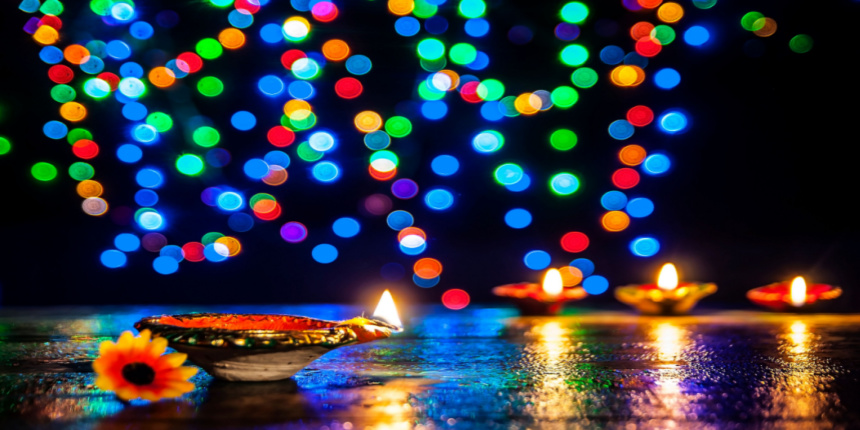Essay on Indian Festival in English for Students
Festivals play a big role in Indian culture, serving as a platform for the expression of our beliefs and feelings. Each community celebrates its festivals and holidays, and all religions are welcome to join in the fun. Here are a few sample essays on the ‘Indian Festival’.

Essay On Indian Festival: Sample 1
India is truly a land of celebrations, where festivals and holidays are deeply ingrained in the culture and society. From religious festivals like Diwali and Eid to cultural festivals like Holi and Pongal, the diversity of India is reflected in the numerous celebrations that take place throughout the year.
Indians place a high value on their festivals, and special arrangements are made to celebrate them in grand style. Homes are decorated with flowers and lights, and people wear new outfits to mark the occasion. Families and friends gather together to exchange gifts, share meals, and make memories.
The diversity of India is also reflected in the different ways festivals are celebrated. Each festival has its unique customs and traditions, which are followed with great devotion and enthusiasm. Even though the celebrations may vary, one thing remains constant - the spirit of unity and togetherness that pervades throughout the country during festival season.
In addition to religious festivals, India also celebrates national holidays with great pride and patriotism. Gandhi Jayanti, Independence Day, and Republic Day are three major national holidays that are celebrated with zeal and enthusiasm. These events remind us of our country's rich history and the sacrifices made by our leaders for the nation's freedom. All in all, Indian festivals and holidays are a time for people to come together and celebrate the richness of our culture and traditions. They are a source of joy and inspiration for all ages and a reflection of the vibrant spirit of India.
Essay On Indian Festival: Sample 2
India is a land of vibrant festivals and celebrations. Throughout the year, various festivals are held across the country, each with its unique customs and traditions. Some of the most popular festivals include Diwali, also known as the "festival of lights", which marks the victory of good over evil and light over darkness. It is celebrated by Hindus, Jains, and Sikhs and typically takes place in October or November. People decorate their homes with oil lamps and lights, and there are fireworks displays and feasts. The five-day festival is also a time for family and friends to gather, exchange gifts, and share meals.
Another major festival is Eid, a Muslim festival that marks the end of the holy month of Ramadan. People dress up in new clothes, visit the mosque for prayers, and celebrate by sharing meals and sweets with their loved ones.
Holi, also known as the "festival of colors", is a spring festival that is celebrated by Hindus, Sikhs, and Jains. It is a festival of joy, where people smear each other with colored powder and water and celebrate by singing and dancing. Holi is also a time for forgiveness and making amends with friends and family.
These festivals are not only celebrated in India but also around the world by people of Indian origin, thus promoting Indian culture globally. They bring people together and promote unity, love, and understanding. Overall, Indian festivals are a reflection of the country's rich cultural heritage and a source of joy for all.
Essay On Indian Festival: Sample 3
India is a place where people from different religions, cultures, and traditions come together to celebrate with joy and enthusiasm. Some of the most popular festivals in India include Diwali, Holi, Dussehra, and Navratri.
Diwali, also known as the "Festival of Lights," is celebrated in October or November to mark the victory of good over evil. People light diyas and candles, decorate their homes with rangolis, and exchange sweets and gifts with their loved ones.
Dussehra, celebrated in September or October, marks the victory of Lord Rama over the demon king Ravana. People burn effigies of Ravana, and the festival is celebrated with great fervor and enthusiasm.
Navratri, celebrated in September or October, is a nine-day festival dedicated to the worship of the goddess Durga. People fast for nine days and perform traditional dances and rituals to honor the goddess.
These are just a few examples of the many festivals that are celebrated in India. Each festival has its unique significance and traditions, but they all bring people together to celebrate and enjoy the richness of Indian culture and heritage.
In addition to the above-mentioned festivals, there are also many regional festivals celebrated across the country, like Pongal, Onam, Bihu, Lohri, and many more. These festivals showcase the diverse cultural and religious traditions of the different regions of India and they all are celebrated with great enthusiasm and joy. Overall, Indian festivals are a celebration of life, love, and unity, and they bring people together in a spirit of joy and happiness.
Applications for Admissions are open.
As per latest syllabus. Physics formulas, equations, & laws of class 11 & 12th chapters
JEE Main Important Chemistry formulas
Get nowAs per latest syllabus. Chemistry formulas, equations, & laws of class 11 & 12th chapters
JEE Main high scoring chapters and topics
Get nowAs per latest 2024 syllabus. Study 40% syllabus and score upto 100% marks in JEE
JEE Main Important Mathematics Formulas
Get nowAs per latest syllabus. Maths formulas, equations, & theorems of class 11 & 12th chapters
